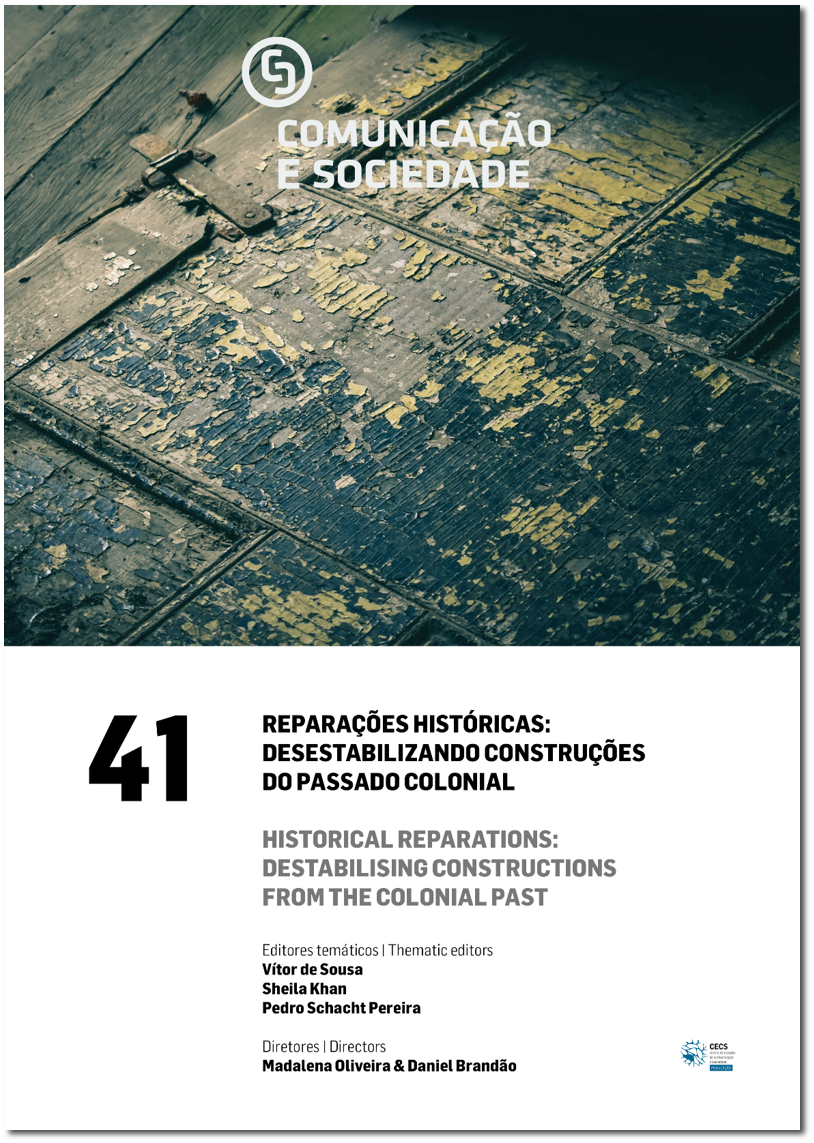Cultural Restitution As a Duty of Memory
DOI:
https://doi.org/10.17231/comsoc.41(2022).4039Abstract
The Duty of Memory, the title that Primo Levi (2011) gave to one of his books, embodies the whole logic that underlies cultural restitution in a process that is underway, aimed at promoting the repair of the damage caused by colonialism. Although reparation will never be completely achieved, the attitude underlying it may reduce resentment in a sign based on diversity and not, as has almost always been the case, on a unilateral logic stemming from a western gaze. Through the use of memory, Levi focused on the holocaust — from which he coined the expression “duty of memory” — he gave his testimony as a Jew who was a prisoner of the Nazis so that nothing similar would ever happen again. An urgent duty of memory is to repair atrocities committed in colonial times through the use of violence by those who colonised. Therefore, the “duty of memory” represents the ethical responsibility never to forget...
Downloads
References
Araújo, A. L. (2017). Reparations for slavery and the slave trade. A transnational and comparative history. Bloomsbury.
Barreiros, I. B. (2021, 25 de outubro). O labor da memória como “intervenção radical” e “reparação”: entrevista com Marita Sturken. Buala. https://www.buala.org/pt/cara-a-cara/o-labor-da-memoria-como-intervencao-radical-e-reparacao-entrevista-com-marita-sturken
Bhabha, H. (1998). O local da cultura (M. Ávila, E. L. L. Reis & G. R. Gonçalves, Trads.). Editora UFMG. (Trabalho original publicado em 1994)
Brito, J. P. (2016). Museus e interrogações num mundo global. In D. R. Curto (Ed.), Estudos sobre a globalização (pp. 509–515). Edições 70.
Catroga, F. (1999). “A história começou a oriente.” O orientalismo em Portugal (séculos XVI-XX): Edifício da Alfândega, Porto, 1999. Comissão Nacional para as Comemorações dos Descobrimentos Portugueses.
Cordeiro, L. (1886). A questão da Guiné n’um discurso de Alexandre Herculano. As Colónias Portuguezas, IV, 25–31.
Curto, D. R. (2021, 7 de julho). Guerras culturais e memória do império. Luxemburger Wort. https://www.wort.lu/pt/sociedade/guerras-culturais-e-mem-ria-do-imperio-60ee9d3ade135b9236f2dbfc
Hall, S. (1992). A identidade cultural na pós-modernidade. DP&A Editora.
Hartog, F. (2003). Regimes d’historicité: Presentisme et experiences du temps. Seuil.
Hicks, D. (2020). The brutish museums. The Benin bronzes, colonial violence and cultural restitution. Pluto Press.
Hirsch, M. (2008). The generation of postmemory. Poetics Today, 29(1), 103–128. https://doi.org/10.1215/03335372-2007-019
Jerónimo, M. B. (2010). Livros brancos, almas negras: A “missão civilizadora” do colonialismo português (c. 1870-1930). Imprensa de Ciências Sociais.
Jerónimo, M. B., & Monteiro, J. P. (2020). Histórias(s) do presente. Os mundos que o passado nos deixou. Público; Edições Tinta-da-China.
Jerónimo, M. B., & Rossa, W. (Eds.). (2021). Patrimónios contestados. Público – Comunicação Social.
Khan, S., Can, N., & Machado, H. (Eds.). (2021). Racism and racial surveillance. Modernity matters. Routledge.
Khan, S., & Machado, H. (2021). Postcolonial racial surveillance through forensic genetics. In S. Khan, N. Can & H. Machado (Eds.), Racism and racial surveillance. Modernity matters (pp. 153–172). Routledge.
Levi, P. (2011). O dever de memória. Cotovia.
Mbembe, A. (2018). Necropolítica. N-1 Edições.
Meneses, M. P. (2021a). As estátuas também se abatem: Momentos da descolonização em Moçambique. Cadernos NAUI, 10(18), 108–128. http://hdl.handle.net/10316/96351
Meneses, M. P. (2021b). Desafios à descolonização epistêmica: Práticas, contextos e lutas para além das fraturas abissais. Contemporânea - revista de sociologia da UFSCa, 10(3), 1067–1097.
Nora, P. (1989). Between memory and history: ‘Les lieux de mémoire’. Representations, (26), 7–24. https://doi.org/10.2307/2928520
Peralta, E. (2022). The return from Africa: Illegitimacy, concealment, and the non-memory of Portugal’s imperial collapse. Memory Studies, 15(1), 52–69. https://doi.org/10.1177%2F1750698019849704
Pereira, P. (2018, setembro). O racismo como herança colonial numa periferia europeia. Electra, 3, 161–167.
Queirós, E. (1960). Obras de Eça de Queiroz, 2. Edição “Livros do Brasil”.
Ribeiro, A. P. (2021). Novo mundo: Arte contemporânea no tempo da pós-memória. Afrontamento.
Ribeiro, A. S. (2021). Pós-memória: Um conceito (ainda) emergente. In A. S. Ribeiro (Ed.), A cena da pós-memória: O presente do passado na Europa pós-colonial (pp. 15–28). Edições Afrontamento.
Ribeiro, M. C., & Rodrigues, F. (2022). Des-cobrir a Europa. Filhos de impérios e pós-memórias europeias. Edições Afrontamento.
Sarr, F., & Savoy, B. (2018). The restitution of african cultural heritage. Toward a new relational ethics. Ministère de la Culture. http://restitutionreport2018.com/sarr_savoy_en.pdf
Savoy, B. (2022). Africa’s struggle for its art. History of a postcolonial defeat. Princeton University Press.
Sousa, V. (2019). Memory as an interculturality booster in Maputo, through the preservation of the colonial statuary. Comunicação e Sociedade [Volume Especial], 269–286. https://doi.org/10.17231/comsoc.0(2019).3073
Sousa, V. (2021). As marcas do luso-tropicalismo nas intervenções do presidente da república português (2016-2021). RCH - Revista de Ciências Humanas, 14(2), 10–24. https://doi.org/10.32813/2179-1120.2121.V14.N2.A744
Sousa, V., Khan, S., & Ribeiro, R. (Eds.). (2020). O mundo na Europa. Crises e identidades. Húmus. https://hdl.handle.net/1822/68605
Soutelo, L. C. (2015). A memória pública do passado recente nas sociedades ibéricas. Revisionismo histórico e combates pela memória em finais do século XX [Tese de doutoramento, Universidade do Porto]. Repositório Aberto. https://repositorio-aberto.up.pt/handle/10216/83844
World conference against racism, racial discrimination, xenophobia and related intolerance: Declaration, 2021, https://www.un.org/WCAR/durban.pdf
Downloads
Published
How to Cite
Issue
Section
License
Copyright (c) 2022 Vítor Sousa

This work is licensed under a Creative Commons Attribution 4.0 International License.
Authors own the copyright, providing the journal with the right of first publication. The work is licensed under a Creative Commons Attribution 4.0 International License.











